Comprehensive Report: Entrepreneurship and Small Business - Unit 9
VerifiedAdded on 2022/12/27
|15
|3829
|441
Report
AI Summary
This report provides a comprehensive analysis of entrepreneurship and small business management. It begins by defining entrepreneurship and differentiating between serial entrepreneurs, entrepreneurs, and owner-managers. It explores various types of entrepreneurial ventures, including lifestyle firms, growth firms, corporate entrepreneurship, micro, small, and medium-sized enterprises, and social enterprises, highlighting their similarities and differences. The report then examines the impact of small businesses on the economy, focusing on creativity, innovation, intellectual property rights, and their contributions at national, regional, and local levels. It also touches upon the international aspects of entrepreneurship. Furthermore, the report delves into the key aspects of an entrepreneurial mindset, including motivation, passion, vision, confidence, decisiveness, and essential skill sets such as communication, business management, and leadership skills. The report contextualizes these concepts with a case study of the Issa Brothers.

Unit 9 - Entrepreneurship and Small
Business Management
Business Management
Paraphrase This Document
Need a fresh take? Get an instant paraphrase of this document with our AI Paraphraser
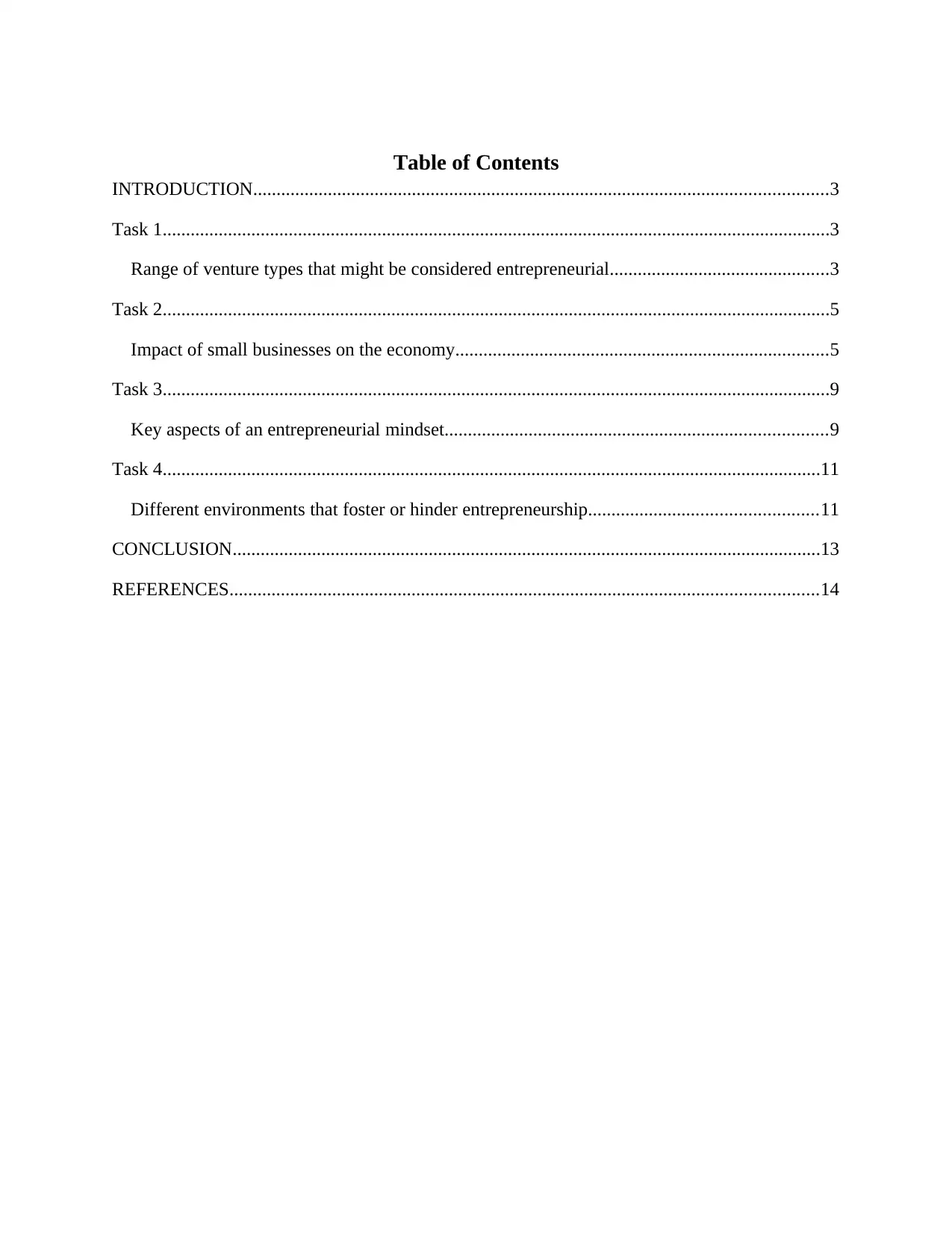
Table of Contents
INTRODUCTION...........................................................................................................................3
Task 1...............................................................................................................................................3
Range of venture types that might be considered entrepreneurial...............................................3
Task 2...............................................................................................................................................5
Impact of small businesses on the economy................................................................................5
Task 3...............................................................................................................................................9
Key aspects of an entrepreneurial mindset..................................................................................9
Task 4.............................................................................................................................................11
Different environments that foster or hinder entrepreneurship.................................................11
CONCLUSION..............................................................................................................................13
REFERENCES..............................................................................................................................14
INTRODUCTION...........................................................................................................................3
Task 1...............................................................................................................................................3
Range of venture types that might be considered entrepreneurial...............................................3
Task 2...............................................................................................................................................5
Impact of small businesses on the economy................................................................................5
Task 3...............................................................................................................................................9
Key aspects of an entrepreneurial mindset..................................................................................9
Task 4.............................................................................................................................................11
Different environments that foster or hinder entrepreneurship.................................................11
CONCLUSION..............................................................................................................................13
REFERENCES..............................................................................................................................14
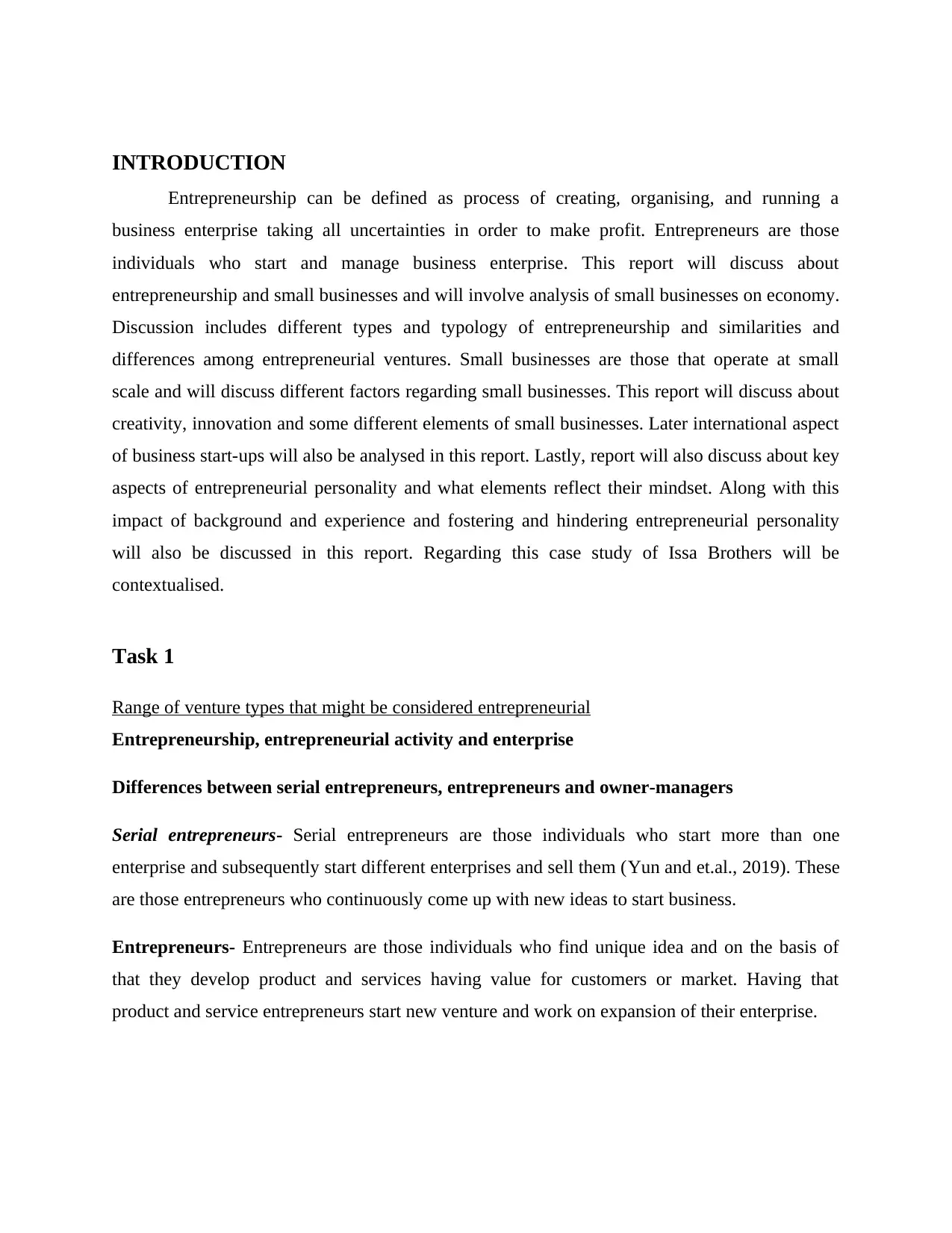
INTRODUCTION
Entrepreneurship can be defined as process of creating, organising, and running a
business enterprise taking all uncertainties in order to make profit. Entrepreneurs are those
individuals who start and manage business enterprise. This report will discuss about
entrepreneurship and small businesses and will involve analysis of small businesses on economy.
Discussion includes different types and typology of entrepreneurship and similarities and
differences among entrepreneurial ventures. Small businesses are those that operate at small
scale and will discuss different factors regarding small businesses. This report will discuss about
creativity, innovation and some different elements of small businesses. Later international aspect
of business start-ups will also be analysed in this report. Lastly, report will also discuss about key
aspects of entrepreneurial personality and what elements reflect their mindset. Along with this
impact of background and experience and fostering and hindering entrepreneurial personality
will also be discussed in this report. Regarding this case study of Issa Brothers will be
contextualised.
Task 1
Range of venture types that might be considered entrepreneurial
Entrepreneurship, entrepreneurial activity and enterprise
Differences between serial entrepreneurs, entrepreneurs and owner-managers
Serial entrepreneurs- Serial entrepreneurs are those individuals who start more than one
enterprise and subsequently start different enterprises and sell them (Yun and et.al., 2019). These
are those entrepreneurs who continuously come up with new ideas to start business.
Entrepreneurs- Entrepreneurs are those individuals who find unique idea and on the basis of
that they develop product and services having value for customers or market. Having that
product and service entrepreneurs start new venture and work on expansion of their enterprise.
Entrepreneurship can be defined as process of creating, organising, and running a
business enterprise taking all uncertainties in order to make profit. Entrepreneurs are those
individuals who start and manage business enterprise. This report will discuss about
entrepreneurship and small businesses and will involve analysis of small businesses on economy.
Discussion includes different types and typology of entrepreneurship and similarities and
differences among entrepreneurial ventures. Small businesses are those that operate at small
scale and will discuss different factors regarding small businesses. This report will discuss about
creativity, innovation and some different elements of small businesses. Later international aspect
of business start-ups will also be analysed in this report. Lastly, report will also discuss about key
aspects of entrepreneurial personality and what elements reflect their mindset. Along with this
impact of background and experience and fostering and hindering entrepreneurial personality
will also be discussed in this report. Regarding this case study of Issa Brothers will be
contextualised.
Task 1
Range of venture types that might be considered entrepreneurial
Entrepreneurship, entrepreneurial activity and enterprise
Differences between serial entrepreneurs, entrepreneurs and owner-managers
Serial entrepreneurs- Serial entrepreneurs are those individuals who start more than one
enterprise and subsequently start different enterprises and sell them (Yun and et.al., 2019). These
are those entrepreneurs who continuously come up with new ideas to start business.
Entrepreneurs- Entrepreneurs are those individuals who find unique idea and on the basis of
that they develop product and services having value for customers or market. Having that
product and service entrepreneurs start new venture and work on expansion of their enterprise.
⊘ This is a preview!⊘
Do you want full access?
Subscribe today to unlock all pages.

Trusted by 1+ million students worldwide
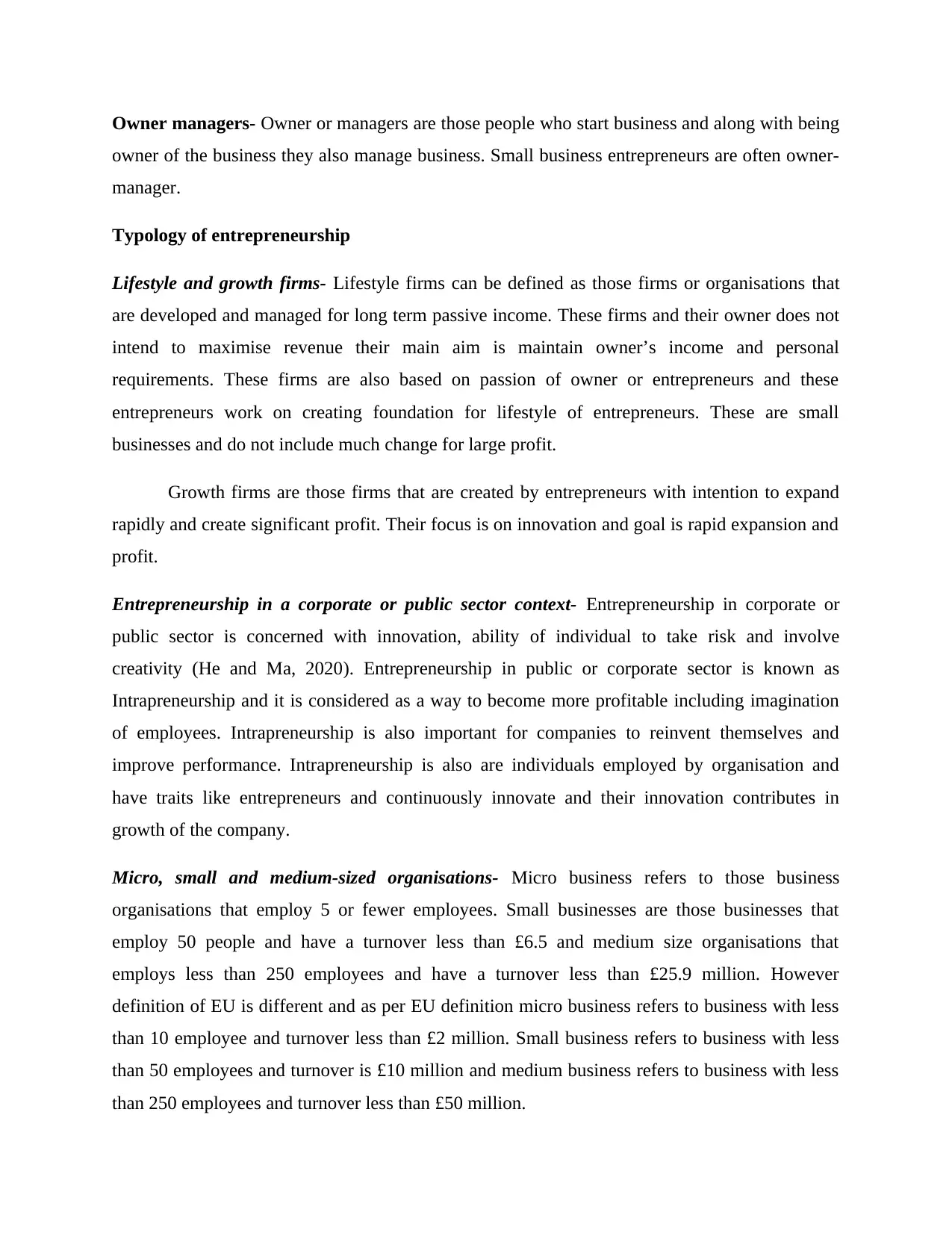
Owner managers- Owner or managers are those people who start business and along with being
owner of the business they also manage business. Small business entrepreneurs are often owner-
manager.
Typology of entrepreneurship
Lifestyle and growth firms- Lifestyle firms can be defined as those firms or organisations that
are developed and managed for long term passive income. These firms and their owner does not
intend to maximise revenue their main aim is maintain owner’s income and personal
requirements. These firms are also based on passion of owner or entrepreneurs and these
entrepreneurs work on creating foundation for lifestyle of entrepreneurs. These are small
businesses and do not include much change for large profit.
Growth firms are those firms that are created by entrepreneurs with intention to expand
rapidly and create significant profit. Their focus is on innovation and goal is rapid expansion and
profit.
Entrepreneurship in a corporate or public sector context- Entrepreneurship in corporate or
public sector is concerned with innovation, ability of individual to take risk and involve
creativity (He and Ma, 2020). Entrepreneurship in public or corporate sector is known as
Intrapreneurship and it is considered as a way to become more profitable including imagination
of employees. Intrapreneurship is also important for companies to reinvent themselves and
improve performance. Intrapreneurship is also are individuals employed by organisation and
have traits like entrepreneurs and continuously innovate and their innovation contributes in
growth of the company.
Micro, small and medium-sized organisations- Micro business refers to those business
organisations that employ 5 or fewer employees. Small businesses are those businesses that
employ 50 people and have a turnover less than £6.5 and medium size organisations that
employs less than 250 employees and have a turnover less than £25.9 million. However
definition of EU is different and as per EU definition micro business refers to business with less
than 10 employee and turnover less than £2 million. Small business refers to business with less
than 50 employees and turnover is £10 million and medium business refers to business with less
than 250 employees and turnover less than £50 million.
owner of the business they also manage business. Small business entrepreneurs are often owner-
manager.
Typology of entrepreneurship
Lifestyle and growth firms- Lifestyle firms can be defined as those firms or organisations that
are developed and managed for long term passive income. These firms and their owner does not
intend to maximise revenue their main aim is maintain owner’s income and personal
requirements. These firms are also based on passion of owner or entrepreneurs and these
entrepreneurs work on creating foundation for lifestyle of entrepreneurs. These are small
businesses and do not include much change for large profit.
Growth firms are those firms that are created by entrepreneurs with intention to expand
rapidly and create significant profit. Their focus is on innovation and goal is rapid expansion and
profit.
Entrepreneurship in a corporate or public sector context- Entrepreneurship in corporate or
public sector is concerned with innovation, ability of individual to take risk and involve
creativity (He and Ma, 2020). Entrepreneurship in public or corporate sector is known as
Intrapreneurship and it is considered as a way to become more profitable including imagination
of employees. Intrapreneurship is also important for companies to reinvent themselves and
improve performance. Intrapreneurship is also are individuals employed by organisation and
have traits like entrepreneurs and continuously innovate and their innovation contributes in
growth of the company.
Micro, small and medium-sized organisations- Micro business refers to those business
organisations that employ 5 or fewer employees. Small businesses are those businesses that
employ 50 people and have a turnover less than £6.5 and medium size organisations that
employs less than 250 employees and have a turnover less than £25.9 million. However
definition of EU is different and as per EU definition micro business refers to business with less
than 10 employee and turnover less than £2 million. Small business refers to business with less
than 50 employees and turnover is £10 million and medium business refers to business with less
than 250 employees and turnover less than £50 million.
Paraphrase This Document
Need a fresh take? Get an instant paraphrase of this document with our AI Paraphraser
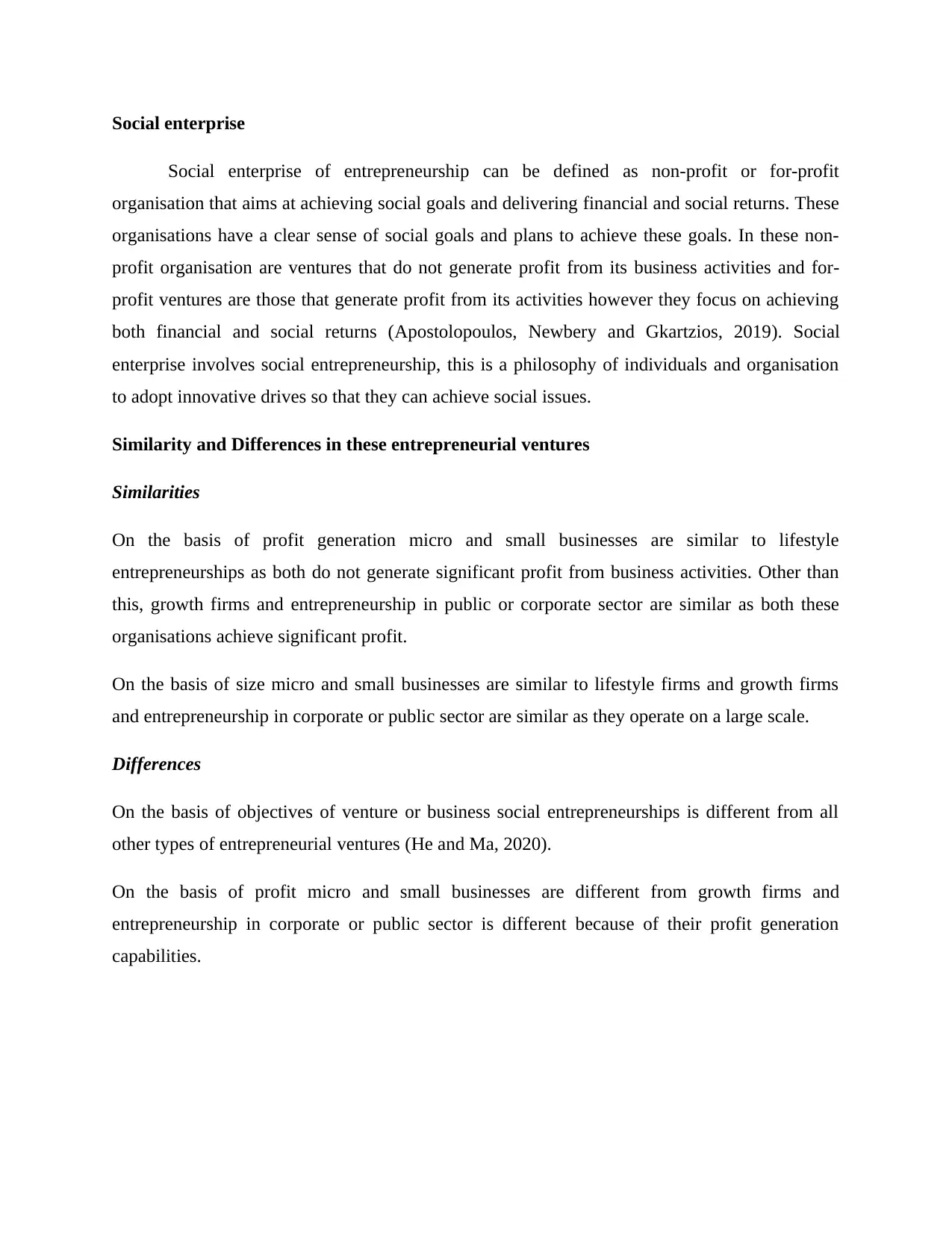
Social enterprise
Social enterprise of entrepreneurship can be defined as non-profit or for-profit
organisation that aims at achieving social goals and delivering financial and social returns. These
organisations have a clear sense of social goals and plans to achieve these goals. In these non-
profit organisation are ventures that do not generate profit from its business activities and for-
profit ventures are those that generate profit from its activities however they focus on achieving
both financial and social returns (Apostolopoulos, Newbery and Gkartzios, 2019). Social
enterprise involves social entrepreneurship, this is a philosophy of individuals and organisation
to adopt innovative drives so that they can achieve social issues.
Similarity and Differences in these entrepreneurial ventures
Similarities
On the basis of profit generation micro and small businesses are similar to lifestyle
entrepreneurships as both do not generate significant profit from business activities. Other than
this, growth firms and entrepreneurship in public or corporate sector are similar as both these
organisations achieve significant profit.
On the basis of size micro and small businesses are similar to lifestyle firms and growth firms
and entrepreneurship in corporate or public sector are similar as they operate on a large scale.
Differences
On the basis of objectives of venture or business social entrepreneurships is different from all
other types of entrepreneurial ventures (He and Ma, 2020).
On the basis of profit micro and small businesses are different from growth firms and
entrepreneurship in corporate or public sector is different because of their profit generation
capabilities.
Social enterprise of entrepreneurship can be defined as non-profit or for-profit
organisation that aims at achieving social goals and delivering financial and social returns. These
organisations have a clear sense of social goals and plans to achieve these goals. In these non-
profit organisation are ventures that do not generate profit from its business activities and for-
profit ventures are those that generate profit from its activities however they focus on achieving
both financial and social returns (Apostolopoulos, Newbery and Gkartzios, 2019). Social
enterprise involves social entrepreneurship, this is a philosophy of individuals and organisation
to adopt innovative drives so that they can achieve social issues.
Similarity and Differences in these entrepreneurial ventures
Similarities
On the basis of profit generation micro and small businesses are similar to lifestyle
entrepreneurships as both do not generate significant profit from business activities. Other than
this, growth firms and entrepreneurship in public or corporate sector are similar as both these
organisations achieve significant profit.
On the basis of size micro and small businesses are similar to lifestyle firms and growth firms
and entrepreneurship in corporate or public sector are similar as they operate on a large scale.
Differences
On the basis of objectives of venture or business social entrepreneurships is different from all
other types of entrepreneurial ventures (He and Ma, 2020).
On the basis of profit micro and small businesses are different from growth firms and
entrepreneurship in corporate or public sector is different because of their profit generation
capabilities.
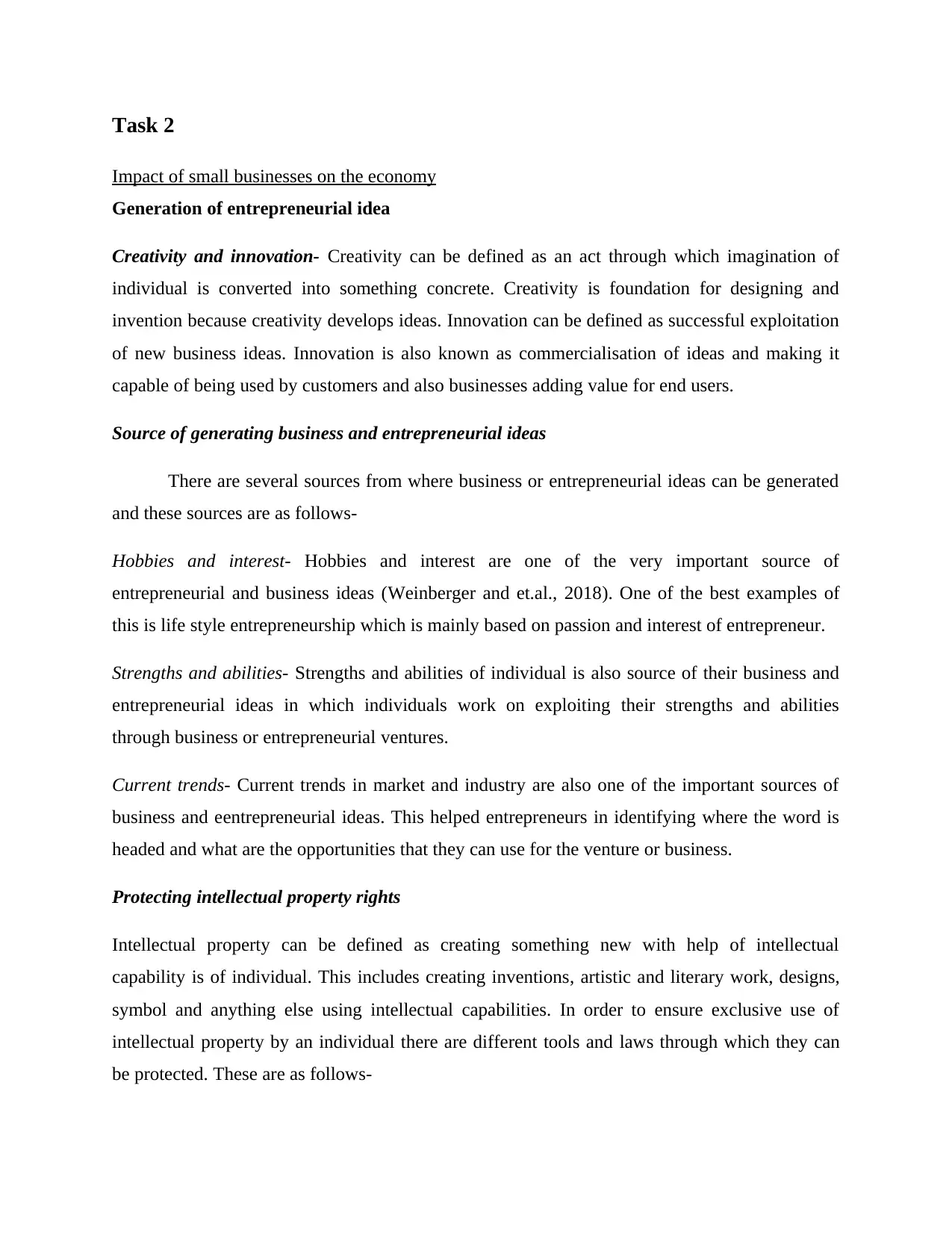
Task 2
Impact of small businesses on the economy
Generation of entrepreneurial idea
Creativity and innovation- Creativity can be defined as an act through which imagination of
individual is converted into something concrete. Creativity is foundation for designing and
invention because creativity develops ideas. Innovation can be defined as successful exploitation
of new business ideas. Innovation is also known as commercialisation of ideas and making it
capable of being used by customers and also businesses adding value for end users.
Source of generating business and entrepreneurial ideas
There are several sources from where business or entrepreneurial ideas can be generated
and these sources are as follows-
Hobbies and interest- Hobbies and interest are one of the very important source of
entrepreneurial and business ideas (Weinberger and et.al., 2018). One of the best examples of
this is life style entrepreneurship which is mainly based on passion and interest of entrepreneur.
Strengths and abilities- Strengths and abilities of individual is also source of their business and
entrepreneurial ideas in which individuals work on exploiting their strengths and abilities
through business or entrepreneurial ventures.
Current trends- Current trends in market and industry are also one of the important sources of
business and eentrepreneurial ideas. This helped entrepreneurs in identifying where the word is
headed and what are the opportunities that they can use for the venture or business.
Protecting intellectual property rights
Intellectual property can be defined as creating something new with help of intellectual
capability is of individual. This includes creating inventions, artistic and literary work, designs,
symbol and anything else using intellectual capabilities. In order to ensure exclusive use of
intellectual property by an individual there are different tools and laws through which they can
be protected. These are as follows-
Impact of small businesses on the economy
Generation of entrepreneurial idea
Creativity and innovation- Creativity can be defined as an act through which imagination of
individual is converted into something concrete. Creativity is foundation for designing and
invention because creativity develops ideas. Innovation can be defined as successful exploitation
of new business ideas. Innovation is also known as commercialisation of ideas and making it
capable of being used by customers and also businesses adding value for end users.
Source of generating business and entrepreneurial ideas
There are several sources from where business or entrepreneurial ideas can be generated
and these sources are as follows-
Hobbies and interest- Hobbies and interest are one of the very important source of
entrepreneurial and business ideas (Weinberger and et.al., 2018). One of the best examples of
this is life style entrepreneurship which is mainly based on passion and interest of entrepreneur.
Strengths and abilities- Strengths and abilities of individual is also source of their business and
entrepreneurial ideas in which individuals work on exploiting their strengths and abilities
through business or entrepreneurial ventures.
Current trends- Current trends in market and industry are also one of the important sources of
business and eentrepreneurial ideas. This helped entrepreneurs in identifying where the word is
headed and what are the opportunities that they can use for the venture or business.
Protecting intellectual property rights
Intellectual property can be defined as creating something new with help of intellectual
capability is of individual. This includes creating inventions, artistic and literary work, designs,
symbol and anything else using intellectual capabilities. In order to ensure exclusive use of
intellectual property by an individual there are different tools and laws through which they can
be protected. These are as follows-
⊘ This is a preview!⊘
Do you want full access?
Subscribe today to unlock all pages.

Trusted by 1+ million students worldwide
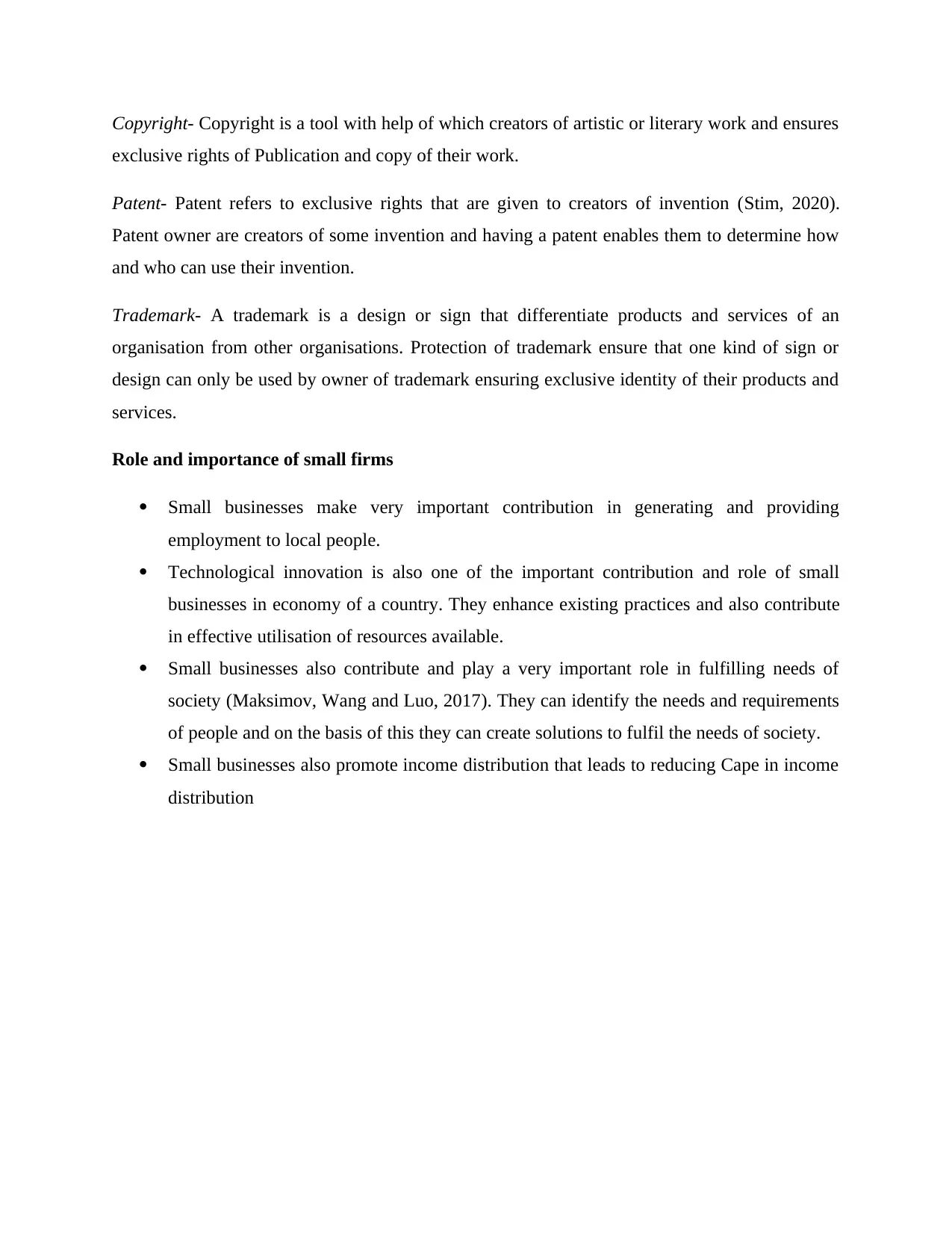
Copyright- Copyright is a tool with help of which creators of artistic or literary work and ensures
exclusive rights of Publication and copy of their work.
Patent- Patent refers to exclusive rights that are given to creators of invention (Stim, 2020).
Patent owner are creators of some invention and having a patent enables them to determine how
and who can use their invention.
Trademark- A trademark is a design or sign that differentiate products and services of an
organisation from other organisations. Protection of trademark ensure that one kind of sign or
design can only be used by owner of trademark ensuring exclusive identity of their products and
services.
Role and importance of small firms
Small businesses make very important contribution in generating and providing
employment to local people.
Technological innovation is also one of the important contribution and role of small
businesses in economy of a country. They enhance existing practices and also contribute
in effective utilisation of resources available.
Small businesses also contribute and play a very important role in fulfilling needs of
society (Maksimov, Wang and Luo, 2017). They can identify the needs and requirements
of people and on the basis of this they can create solutions to fulfil the needs of society.
Small businesses also promote income distribution that leads to reducing Cape in income
distribution
exclusive rights of Publication and copy of their work.
Patent- Patent refers to exclusive rights that are given to creators of invention (Stim, 2020).
Patent owner are creators of some invention and having a patent enables them to determine how
and who can use their invention.
Trademark- A trademark is a design or sign that differentiate products and services of an
organisation from other organisations. Protection of trademark ensure that one kind of sign or
design can only be used by owner of trademark ensuring exclusive identity of their products and
services.
Role and importance of small firms
Small businesses make very important contribution in generating and providing
employment to local people.
Technological innovation is also one of the important contribution and role of small
businesses in economy of a country. They enhance existing practices and also contribute
in effective utilisation of resources available.
Small businesses also contribute and play a very important role in fulfilling needs of
society (Maksimov, Wang and Luo, 2017). They can identify the needs and requirements
of people and on the basis of this they can create solutions to fulfil the needs of society.
Small businesses also promote income distribution that leads to reducing Cape in income
distribution
Paraphrase This Document
Need a fresh take? Get an instant paraphrase of this document with our AI Paraphraser
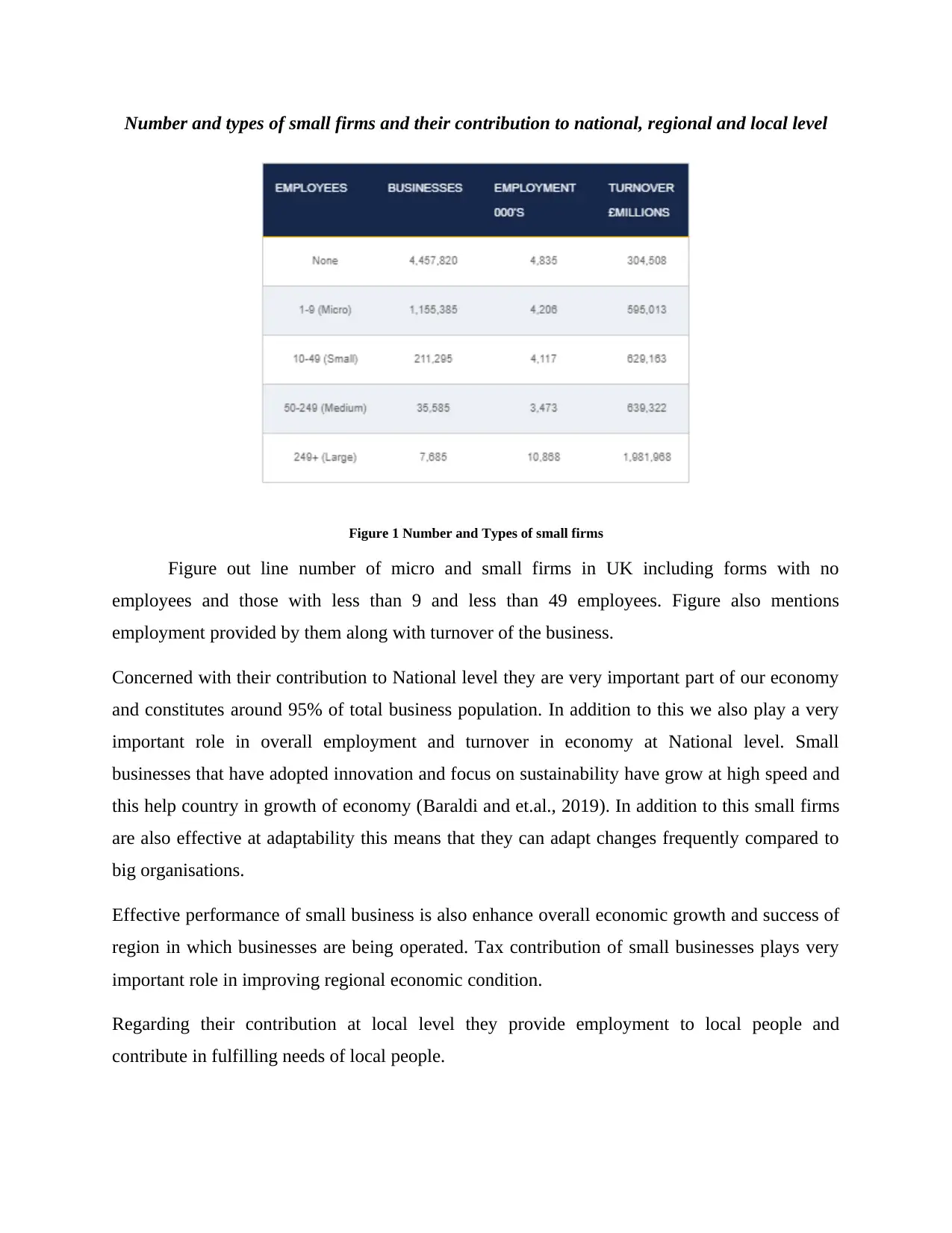
Number and types of small firms and their contribution to national, regional and local level
Figure 1 Number and Types of small firms
Figure out line number of micro and small firms in UK including forms with no
employees and those with less than 9 and less than 49 employees. Figure also mentions
employment provided by them along with turnover of the business.
Concerned with their contribution to National level they are very important part of our economy
and constitutes around 95% of total business population. In addition to this we also play a very
important role in overall employment and turnover in economy at National level. Small
businesses that have adopted innovation and focus on sustainability have grow at high speed and
this help country in growth of economy (Baraldi and et.al., 2019). In addition to this small firms
are also effective at adaptability this means that they can adapt changes frequently compared to
big organisations.
Effective performance of small business is also enhance overall economic growth and success of
region in which businesses are being operated. Tax contribution of small businesses plays very
important role in improving regional economic condition.
Regarding their contribution at local level they provide employment to local people and
contribute in fulfilling needs of local people.
Figure 1 Number and Types of small firms
Figure out line number of micro and small firms in UK including forms with no
employees and those with less than 9 and less than 49 employees. Figure also mentions
employment provided by them along with turnover of the business.
Concerned with their contribution to National level they are very important part of our economy
and constitutes around 95% of total business population. In addition to this we also play a very
important role in overall employment and turnover in economy at National level. Small
businesses that have adopted innovation and focus on sustainability have grow at high speed and
this help country in growth of economy (Baraldi and et.al., 2019). In addition to this small firms
are also effective at adaptability this means that they can adapt changes frequently compared to
big organisations.
Effective performance of small business is also enhance overall economic growth and success of
region in which businesses are being operated. Tax contribution of small businesses plays very
important role in improving regional economic condition.
Regarding their contribution at local level they provide employment to local people and
contribute in fulfilling needs of local people.
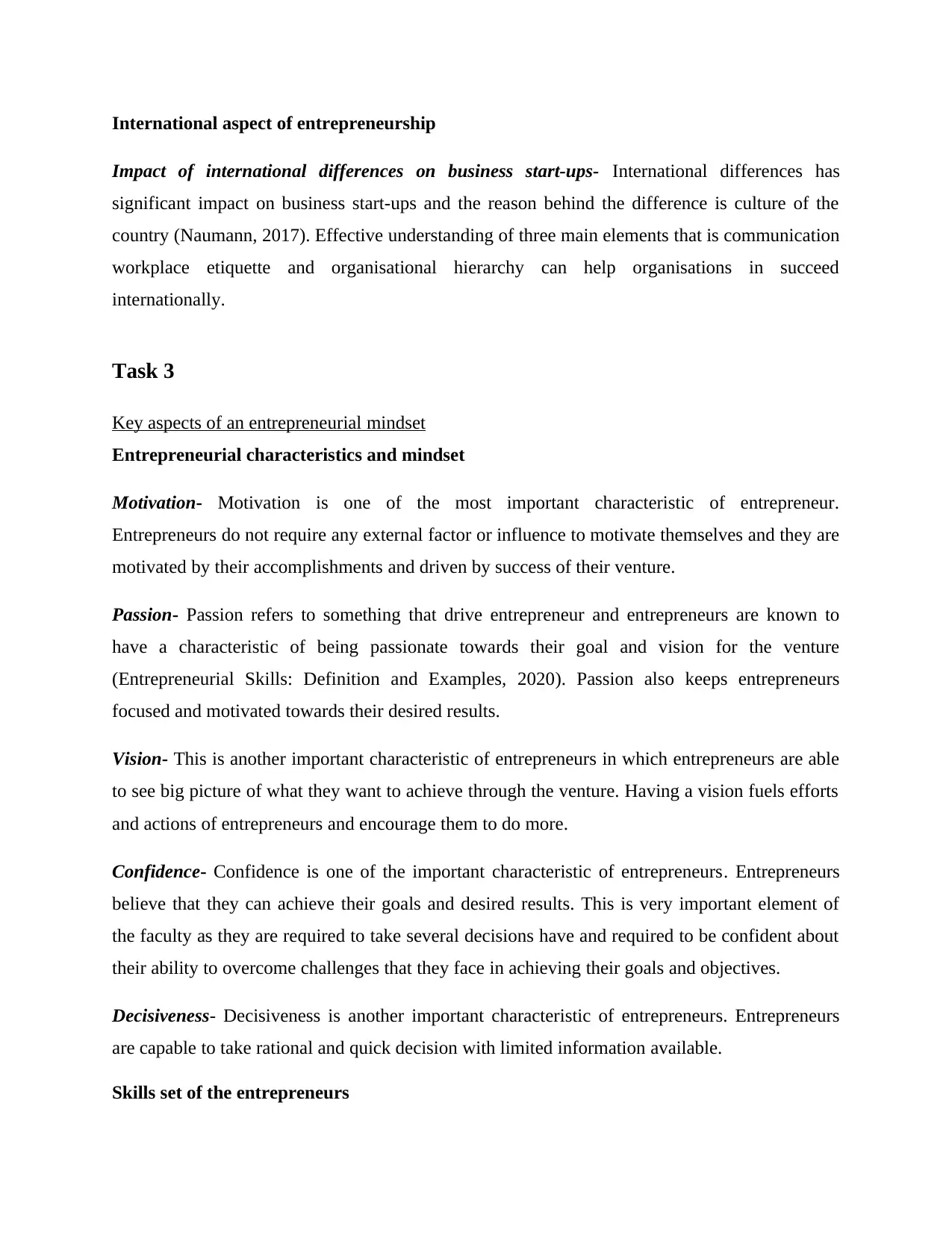
International aspect of entrepreneurship
Impact of international differences on business start-ups- International differences has
significant impact on business start-ups and the reason behind the difference is culture of the
country (Naumann, 2017). Effective understanding of three main elements that is communication
workplace etiquette and organisational hierarchy can help organisations in succeed
internationally.
Task 3
Key aspects of an entrepreneurial mindset
Entrepreneurial characteristics and mindset
Motivation- Motivation is one of the most important characteristic of entrepreneur.
Entrepreneurs do not require any external factor or influence to motivate themselves and they are
motivated by their accomplishments and driven by success of their venture.
Passion- Passion refers to something that drive entrepreneur and entrepreneurs are known to
have a characteristic of being passionate towards their goal and vision for the venture
(Entrepreneurial Skills: Definition and Examples, 2020). Passion also keeps entrepreneurs
focused and motivated towards their desired results.
Vision- This is another important characteristic of entrepreneurs in which entrepreneurs are able
to see big picture of what they want to achieve through the venture. Having a vision fuels efforts
and actions of entrepreneurs and encourage them to do more.
Confidence- Confidence is one of the important characteristic of entrepreneurs. Entrepreneurs
believe that they can achieve their goals and desired results. This is very important element of
the faculty as they are required to take several decisions have and required to be confident about
their ability to overcome challenges that they face in achieving their goals and objectives.
Decisiveness- Decisiveness is another important characteristic of entrepreneurs. Entrepreneurs
are capable to take rational and quick decision with limited information available.
Skills set of the entrepreneurs
Impact of international differences on business start-ups- International differences has
significant impact on business start-ups and the reason behind the difference is culture of the
country (Naumann, 2017). Effective understanding of three main elements that is communication
workplace etiquette and organisational hierarchy can help organisations in succeed
internationally.
Task 3
Key aspects of an entrepreneurial mindset
Entrepreneurial characteristics and mindset
Motivation- Motivation is one of the most important characteristic of entrepreneur.
Entrepreneurs do not require any external factor or influence to motivate themselves and they are
motivated by their accomplishments and driven by success of their venture.
Passion- Passion refers to something that drive entrepreneur and entrepreneurs are known to
have a characteristic of being passionate towards their goal and vision for the venture
(Entrepreneurial Skills: Definition and Examples, 2020). Passion also keeps entrepreneurs
focused and motivated towards their desired results.
Vision- This is another important characteristic of entrepreneurs in which entrepreneurs are able
to see big picture of what they want to achieve through the venture. Having a vision fuels efforts
and actions of entrepreneurs and encourage them to do more.
Confidence- Confidence is one of the important characteristic of entrepreneurs. Entrepreneurs
believe that they can achieve their goals and desired results. This is very important element of
the faculty as they are required to take several decisions have and required to be confident about
their ability to overcome challenges that they face in achieving their goals and objectives.
Decisiveness- Decisiveness is another important characteristic of entrepreneurs. Entrepreneurs
are capable to take rational and quick decision with limited information available.
Skills set of the entrepreneurs
⊘ This is a preview!⊘
Do you want full access?
Subscribe today to unlock all pages.

Trusted by 1+ million students worldwide
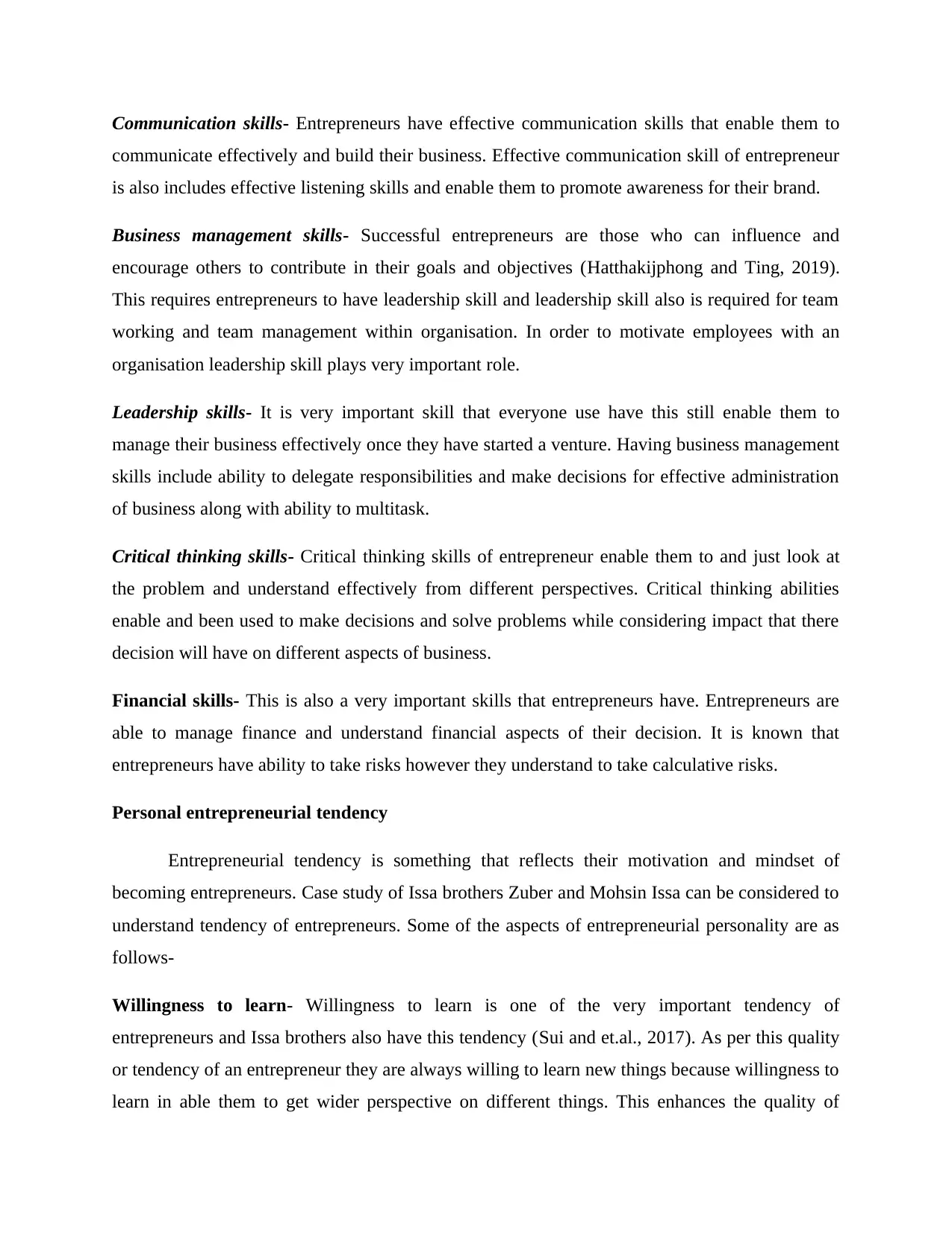
Communication skills- Entrepreneurs have effective communication skills that enable them to
communicate effectively and build their business. Effective communication skill of entrepreneur
is also includes effective listening skills and enable them to promote awareness for their brand.
Business management skills- Successful entrepreneurs are those who can influence and
encourage others to contribute in their goals and objectives (Hatthakijphong and Ting, 2019).
This requires entrepreneurs to have leadership skill and leadership skill also is required for team
working and team management within organisation. In order to motivate employees with an
organisation leadership skill plays very important role.
Leadership skills- It is very important skill that everyone use have this still enable them to
manage their business effectively once they have started a venture. Having business management
skills include ability to delegate responsibilities and make decisions for effective administration
of business along with ability to multitask.
Critical thinking skills- Critical thinking skills of entrepreneur enable them to and just look at
the problem and understand effectively from different perspectives. Critical thinking abilities
enable and been used to make decisions and solve problems while considering impact that there
decision will have on different aspects of business.
Financial skills- This is also a very important skills that entrepreneurs have. Entrepreneurs are
able to manage finance and understand financial aspects of their decision. It is known that
entrepreneurs have ability to take risks however they understand to take calculative risks.
Personal entrepreneurial tendency
Entrepreneurial tendency is something that reflects their motivation and mindset of
becoming entrepreneurs. Case study of Issa brothers Zuber and Mohsin Issa can be considered to
understand tendency of entrepreneurs. Some of the aspects of entrepreneurial personality are as
follows-
Willingness to learn- Willingness to learn is one of the very important tendency of
entrepreneurs and Issa brothers also have this tendency (Sui and et.al., 2017). As per this quality
or tendency of an entrepreneur they are always willing to learn new things because willingness to
learn in able them to get wider perspective on different things. This enhances the quality of
communicate effectively and build their business. Effective communication skill of entrepreneur
is also includes effective listening skills and enable them to promote awareness for their brand.
Business management skills- Successful entrepreneurs are those who can influence and
encourage others to contribute in their goals and objectives (Hatthakijphong and Ting, 2019).
This requires entrepreneurs to have leadership skill and leadership skill also is required for team
working and team management within organisation. In order to motivate employees with an
organisation leadership skill plays very important role.
Leadership skills- It is very important skill that everyone use have this still enable them to
manage their business effectively once they have started a venture. Having business management
skills include ability to delegate responsibilities and make decisions for effective administration
of business along with ability to multitask.
Critical thinking skills- Critical thinking skills of entrepreneur enable them to and just look at
the problem and understand effectively from different perspectives. Critical thinking abilities
enable and been used to make decisions and solve problems while considering impact that there
decision will have on different aspects of business.
Financial skills- This is also a very important skills that entrepreneurs have. Entrepreneurs are
able to manage finance and understand financial aspects of their decision. It is known that
entrepreneurs have ability to take risks however they understand to take calculative risks.
Personal entrepreneurial tendency
Entrepreneurial tendency is something that reflects their motivation and mindset of
becoming entrepreneurs. Case study of Issa brothers Zuber and Mohsin Issa can be considered to
understand tendency of entrepreneurs. Some of the aspects of entrepreneurial personality are as
follows-
Willingness to learn- Willingness to learn is one of the very important tendency of
entrepreneurs and Issa brothers also have this tendency (Sui and et.al., 2017). As per this quality
or tendency of an entrepreneur they are always willing to learn new things because willingness to
learn in able them to get wider perspective on different things. This enhances the quality of
Paraphrase This Document
Need a fresh take? Get an instant paraphrase of this document with our AI Paraphraser
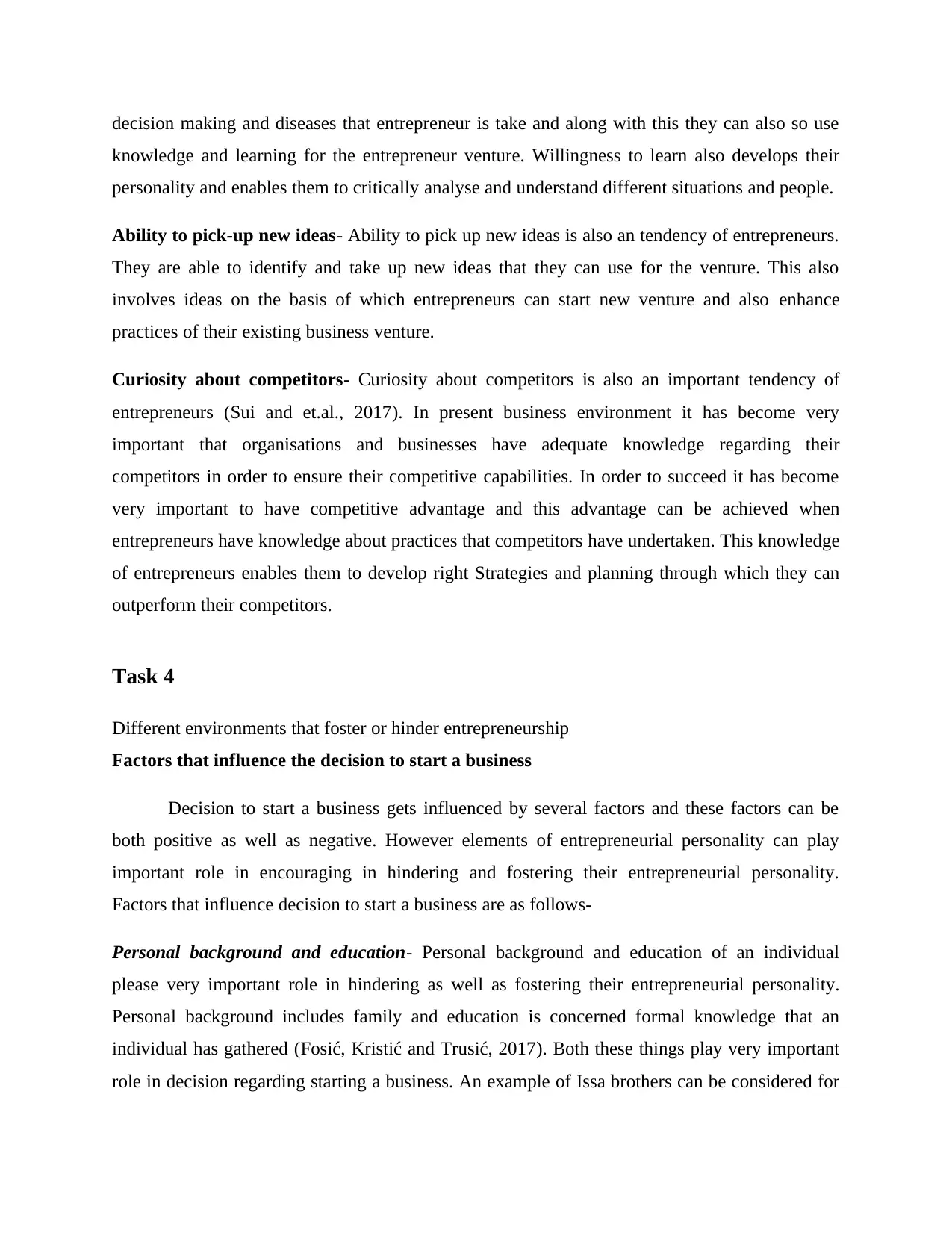
decision making and diseases that entrepreneur is take and along with this they can also so use
knowledge and learning for the entrepreneur venture. Willingness to learn also develops their
personality and enables them to critically analyse and understand different situations and people.
Ability to pick-up new ideas- Ability to pick up new ideas is also an tendency of entrepreneurs.
They are able to identify and take up new ideas that they can use for the venture. This also
involves ideas on the basis of which entrepreneurs can start new venture and also enhance
practices of their existing business venture.
Curiosity about competitors- Curiosity about competitors is also an important tendency of
entrepreneurs (Sui and et.al., 2017). In present business environment it has become very
important that organisations and businesses have adequate knowledge regarding their
competitors in order to ensure their competitive capabilities. In order to succeed it has become
very important to have competitive advantage and this advantage can be achieved when
entrepreneurs have knowledge about practices that competitors have undertaken. This knowledge
of entrepreneurs enables them to develop right Strategies and planning through which they can
outperform their competitors.
Task 4
Different environments that foster or hinder entrepreneurship
Factors that influence the decision to start a business
Decision to start a business gets influenced by several factors and these factors can be
both positive as well as negative. However elements of entrepreneurial personality can play
important role in encouraging in hindering and fostering their entrepreneurial personality.
Factors that influence decision to start a business are as follows-
Personal background and education- Personal background and education of an individual
please very important role in hindering as well as fostering their entrepreneurial personality.
Personal background includes family and education is concerned formal knowledge that an
individual has gathered (Fosić, Kristić and Trusić, 2017). Both these things play very important
role in decision regarding starting a business. An example of Issa brothers can be considered for
knowledge and learning for the entrepreneur venture. Willingness to learn also develops their
personality and enables them to critically analyse and understand different situations and people.
Ability to pick-up new ideas- Ability to pick up new ideas is also an tendency of entrepreneurs.
They are able to identify and take up new ideas that they can use for the venture. This also
involves ideas on the basis of which entrepreneurs can start new venture and also enhance
practices of their existing business venture.
Curiosity about competitors- Curiosity about competitors is also an important tendency of
entrepreneurs (Sui and et.al., 2017). In present business environment it has become very
important that organisations and businesses have adequate knowledge regarding their
competitors in order to ensure their competitive capabilities. In order to succeed it has become
very important to have competitive advantage and this advantage can be achieved when
entrepreneurs have knowledge about practices that competitors have undertaken. This knowledge
of entrepreneurs enables them to develop right Strategies and planning through which they can
outperform their competitors.
Task 4
Different environments that foster or hinder entrepreneurship
Factors that influence the decision to start a business
Decision to start a business gets influenced by several factors and these factors can be
both positive as well as negative. However elements of entrepreneurial personality can play
important role in encouraging in hindering and fostering their entrepreneurial personality.
Factors that influence decision to start a business are as follows-
Personal background and education- Personal background and education of an individual
please very important role in hindering as well as fostering their entrepreneurial personality.
Personal background includes family and education is concerned formal knowledge that an
individual has gathered (Fosić, Kristić and Trusić, 2017). Both these things play very important
role in decision regarding starting a business. An example of Issa brothers can be considered for
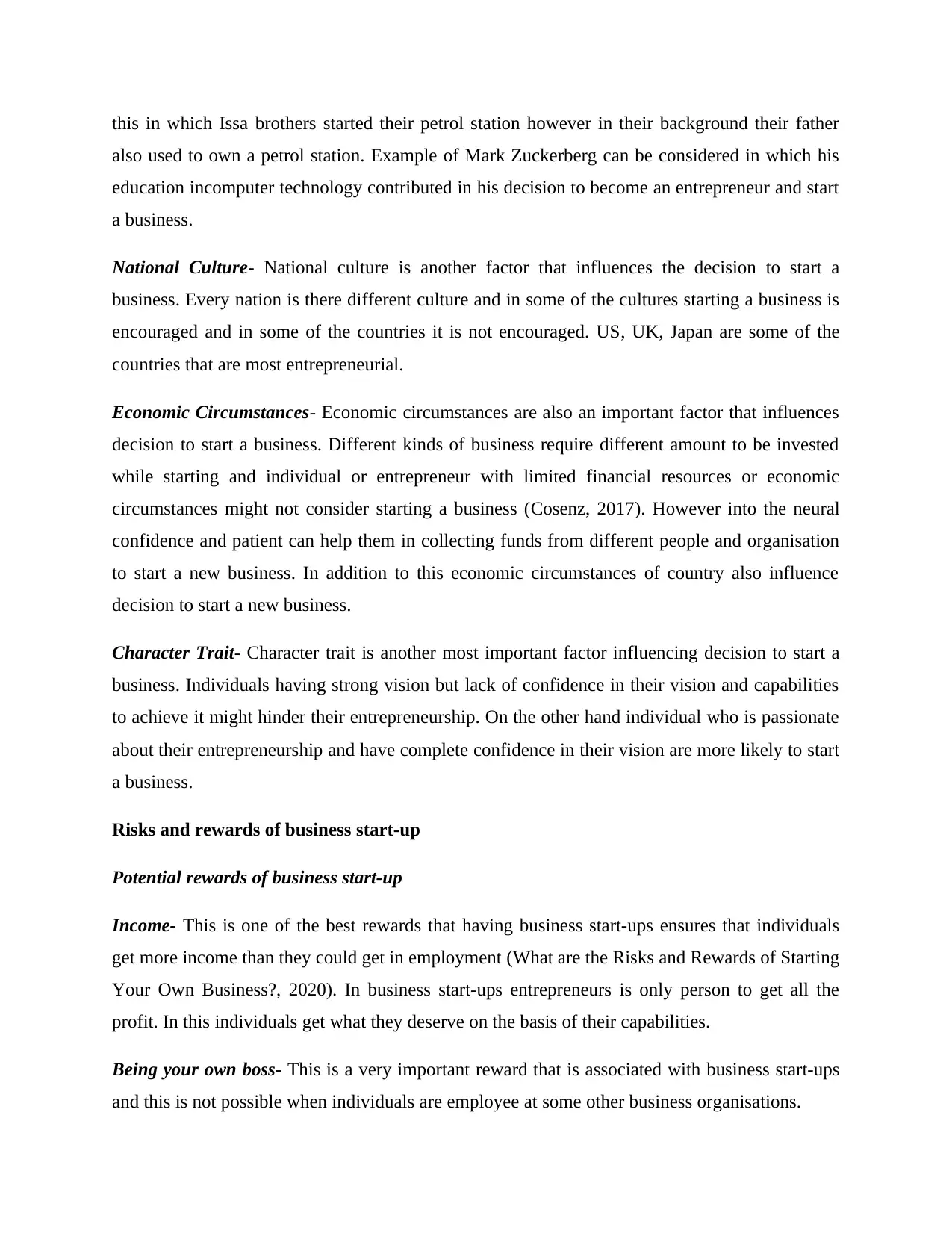
this in which Issa brothers started their petrol station however in their background their father
also used to own a petrol station. Example of Mark Zuckerberg can be considered in which his
education incomputer technology contributed in his decision to become an entrepreneur and start
a business.
National Culture- National culture is another factor that influences the decision to start a
business. Every nation is there different culture and in some of the cultures starting a business is
encouraged and in some of the countries it is not encouraged. US, UK, Japan are some of the
countries that are most entrepreneurial.
Economic Circumstances- Economic circumstances are also an important factor that influences
decision to start a business. Different kinds of business require different amount to be invested
while starting and individual or entrepreneur with limited financial resources or economic
circumstances might not consider starting a business (Cosenz, 2017). However into the neural
confidence and patient can help them in collecting funds from different people and organisation
to start a new business. In addition to this economic circumstances of country also influence
decision to start a new business.
Character Trait- Character trait is another most important factor influencing decision to start a
business. Individuals having strong vision but lack of confidence in their vision and capabilities
to achieve it might hinder their entrepreneurship. On the other hand individual who is passionate
about their entrepreneurship and have complete confidence in their vision are more likely to start
a business.
Risks and rewards of business start-up
Potential rewards of business start-up
Income- This is one of the best rewards that having business start-ups ensures that individuals
get more income than they could get in employment (What are the Risks and Rewards of Starting
Your Own Business?, 2020). In business start-ups entrepreneurs is only person to get all the
profit. In this individuals get what they deserve on the basis of their capabilities.
Being your own boss- This is a very important reward that is associated with business start-ups
and this is not possible when individuals are employee at some other business organisations.
also used to own a petrol station. Example of Mark Zuckerberg can be considered in which his
education incomputer technology contributed in his decision to become an entrepreneur and start
a business.
National Culture- National culture is another factor that influences the decision to start a
business. Every nation is there different culture and in some of the cultures starting a business is
encouraged and in some of the countries it is not encouraged. US, UK, Japan are some of the
countries that are most entrepreneurial.
Economic Circumstances- Economic circumstances are also an important factor that influences
decision to start a business. Different kinds of business require different amount to be invested
while starting and individual or entrepreneur with limited financial resources or economic
circumstances might not consider starting a business (Cosenz, 2017). However into the neural
confidence and patient can help them in collecting funds from different people and organisation
to start a new business. In addition to this economic circumstances of country also influence
decision to start a new business.
Character Trait- Character trait is another most important factor influencing decision to start a
business. Individuals having strong vision but lack of confidence in their vision and capabilities
to achieve it might hinder their entrepreneurship. On the other hand individual who is passionate
about their entrepreneurship and have complete confidence in their vision are more likely to start
a business.
Risks and rewards of business start-up
Potential rewards of business start-up
Income- This is one of the best rewards that having business start-ups ensures that individuals
get more income than they could get in employment (What are the Risks and Rewards of Starting
Your Own Business?, 2020). In business start-ups entrepreneurs is only person to get all the
profit. In this individuals get what they deserve on the basis of their capabilities.
Being your own boss- This is a very important reward that is associated with business start-ups
and this is not possible when individuals are employee at some other business organisations.
⊘ This is a preview!⊘
Do you want full access?
Subscribe today to unlock all pages.

Trusted by 1+ million students worldwide
1 out of 15
Related Documents
Your All-in-One AI-Powered Toolkit for Academic Success.
+13062052269
info@desklib.com
Available 24*7 on WhatsApp / Email
![[object Object]](/_next/static/media/star-bottom.7253800d.svg)
Unlock your academic potential
Copyright © 2020–2026 A2Z Services. All Rights Reserved. Developed and managed by ZUCOL.





![Entrepreneurship and Small Business Management Report - [University]](/_next/image/?url=https%3A%2F%2Fdesklib.com%2Fmedia%2Fimages%2Fos%2Fd8afc29cbfd846d4899a8ced859f5763.jpg&w=256&q=75)